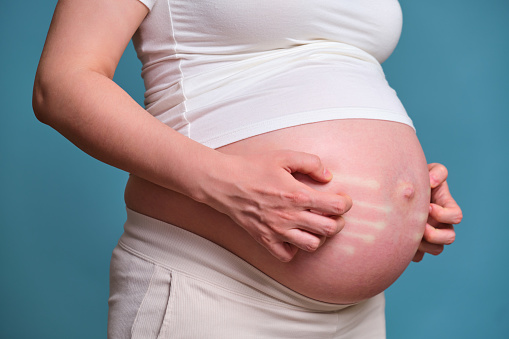Pregnancy itching is a typical symptom, especially as the pregnancy progresses. Numerous things, including hormonal changes, stretching of the skin, and increased blood flow, can contribute to its development. Itching can occasionally also be a sign of a more serious ailment, such as pregnancy-related cholestasis, a liver disorder. This blog post will take you through the causes, symptoms & complications, treatment options, and frequently asked questions related to itching during pregnancy.
What causes itching during pregnancy?

One typical symptom of pregnancy is itching, which can have a variety of causes. Among the most frequent causes are:
- Hormonal changes: Pregnancy hormones can increase skin sensitivity, which can cause itching.
- Skin stretching: The skin extends as the baby grows to make room for the expanding uterus. Itching may result from this stretching, especially in the abdomen, breasts, and thighs.
- Increased blood flow: The skin receives more blood while a woman is pregnant, which might itch.
- Cholestasis: Pregnant women can develop cholestasis, a liver ailment. It typically manifests in the last few weeks of pregnancy. Itchy skin, typically on the hands and feet, and the building up of bile acids in the blood, are defining features.
- Other skin conditions: Pregnant women are more likely to acquire itch-producing skin conditions including eczema and psoriasis.
It’s crucial to remember that while itching is a typical pregnant symptom, it can also be a sign of other, graver illnesses like pregnancy cholestasis. A healthcare professional should be consulted if you suffer severe itching or itching that is accompanied by other symptoms like jaundice or black urine in order to receive the right diagnosis and treatments.
Symptoms of cholestasis of pregnancy

The primary symptom is itching, which is typically present on the hands and feet and may be so severe that it can interfere with everyday activities and sleep. Other signs can include:
- Jaundice: A build-up of bilirubin in the blood results in a yellowing of the skin and sclera of eyes (eye whites).
- Dark urine
- Light-colored stools
- Fatigue
- Nausea
- Appetite reduction
Some women with cholestasis may not experience all these symptoms and may have just mild symptoms. It’s important to consult a doctor to rule out any other cause or for proper diagnosis and treatment.
Diagnosis and treatment options for cholestasis of pregnancy

Measurements of specific liver enzymes, such as bile acid, in the blood are used to diagnose cholestasis of pregnancy. To rule out further potential causes of itching and jaundice, additional tests may also be carried out, such as a liver function test.
Treatment options for cholestasis of pregnancy could include:
- Drugs: Ursodeoxycholic acid (UDCA), a drug that helps to enhance liver function and relieve itching, is available.
- Close monitoring of the infant: The health of the infant may be checked through fetal monitoring techniques including ultrasound and non-stress tests.
- Early delivery: To avoid problems, early delivery may be advised in specific circumstances.
- Symptomatic relief: Calamine lotion, antihistamines, and moisturizers are examples of over-the-counter drugs that help ease itching.
- Changes in lifestyle: Pregnant women with cholestasis of pregnancy are recommended to stay away from alcohol and consume less coffee.
It’s crucial to remember that every case is unique, and the healthcare practitioner will collaborate with the lady to create a treatment plan that is best for both her and her unborn child.
Managing itching during pregnancy: Tips and self-care strategies

Although itching during pregnancy can be a bothersome and annoying symptom, there are a number of ways to control it:
- Maintain proper hydration: Maintaining proper hydration will assist to lessen itching. After taking a shower or bath, moisturize with a mild, fragrance-free product.
- Dress comfortably: Dressing comfortably can help to lessen itching, especially in places like the thighs, breasts, and tummy. The skin might become irritated by synthetic textiles and tight garments.
- Steer clear of hot baths and showers because they might dry out your skin and make you itch. Take lukewarm baths and showers instead, and stay away from abrasive soaps and scrubs.
- Use a cold compress to relieve itching: Applying a cold compress to irritated areas can assist. Consider using a cold pack or a towel-wrapped bag of frozen vegetables.
- Avoid specific foods: Some women discover that some foods can make their itching worse. Citrus fruits, spicy meals, and chocolate are typical triggers.
- Use over-the-counter drugs to relieve itching, such as calamine lotion and over-the-counter antihistamines. Prior to taking any drugs, be sure to consult a healthcare professional.
- Get adequate sleep: Sleeping sufficiently can ease weariness and itching.
- Take regular showers or baths to keep your skin clean, and stay away from harsh soaps and scrubs.
It’s crucial to remember that these suggestions may not totally stop itching during pregnancy, even though they can help control it. It’s crucial to see a doctor for a correct diagnosis and course of treatment if the itching is severe or accompanied by other symptoms like jaundice or black urine.
Complications and risks of cholestasis of pregnancy

Cholestasis of pregnancy is a relatively rare condition, but it can have serious complications for both the mother and the baby if left untreated. Some of the potential complications and risks of cholestasis of pregnancy include:
- Fetal distress: Cholestasis of pregnancy can lead to fetal distress, which is a condition in which the baby is not getting enough oxygen. This can lead to serious complications such as stillbirth.
- Preterm labor: Cholestasis of pregnancy can also increase the risk of preterm labor.
- Neonatal complications: Babies born to mothers with cholestasis of pregnancy may be at increased risk of neonatal jaundice, respiratory distress, and other complications.
- Maternal complications: Cholestasis of pregnancy can lead to serious maternal complications such as jaundice, pruritus, fatigue, and depression.
- Recurrent cholestasis of pregnancy: Cholestasis of pregnancy can recur in future pregnancies, so it’s important to discuss any future pregnancy plans with the healthcare provider.
It’s important to note that prompt diagnosis and treatment can reduce the risk of complications and improve outcomes for both the mother and the baby. Regular follow-up with a healthcare provider is important for monitoring and treatment adjustments.
Preparing for delivery: Monitoring and care for mother and baby

Regular monitoring is the key in order to reduce the dangers for both the mother and the baby. Among the preparations that could be made for delivery are the following:
- Fetal monitoring: It’s important to conduct close fetal monitoring to make sure the infant is receiving enough oxygen and that no signs of distress are present. Regular non-stress examinations, biophysical profiles, and fetal heart rate monitoring are a few examples of this.
- Labor induction: To reduce the chance of stillbirth, induction of labor may be advised depending on the baby’s gestational age.
- Cesarean section: In some circumstances, a cesarean section may be advised to reduce the risk of complications.
- Neonatal care: After delivery, it’s crucial to closely monitor and look after the newborn. Monitoring for jaundice, respiratory distress, and other problems may be part of this.
- Maternal care: After delivery, it’s critical to closely observe and take care of the mother. This can entail keeping an eye out for problems like tiredness, pruritus, and jaundice.
Regular follow-ups with your doctor will ensure proper monitoring and therapy modifications, so do not miss those appointments.
Frequently asked questions

Q1) How common is cholestasis in pregnancy?
Cholestasis of pregnancy is a rare condition, affecting about 1 in 1,000 pregnancies. It is more common in women of Latin American, Indian, and Pakistani descent.
Q2) What causes cholestasis in pregnancy?
The exact cause of cholestasis during pregnancy is not known, but it is believed to be related to hormonal changes during pregnancy that slow down the flow of bile from the liver. This can lead to a build-up of bile acids in the blood, which causes itching and can lead to other complications.
Q3) How is cholestasis of pregnancy diagnosed?
Cholestasis of pregnancy is typically diagnosed based on symptoms and laboratory results. Blood tests may be used to measure bile acid levels, liver function, and other markers.
Q4) What are the treatment options for cholestasis of pregnancy?
Treatment options for cholestasis of pregnancy include:
- Medications such as ursodeoxycholic acid (UDCA), can help to reduce itching and prevent complications
- Vitamin K supplements to help prevent bleeding in new-borns
- Inducing labor or scheduling for cesarean delivery before the due date to minimize the risk of stillbirth.
Q5) How can I prepare for future pregnancies if I have a history of cholestasis of pregnancy?
If you have a history of cholestasis of pregnancy, it’s important to talk to your healthcare provider about your options for future pregnancies. You may be started on treatment for cholestasis before pregnancy and close monitoring during pregnancy.
Conclusion
Itching during pregnancy can be a distressing symptom and enough should be known about it to avoid going into panic mode. Understanding the causes and symptoms of cholestasis of pregnancy, as well as implementing lifestyle changes recommended by healthcare providers, can help manage this condition and promote a healthy pregnancy.

Akanksha Sharma
Dr. Akanksha Sharma, Head Writer and creator of AtoZ of Pregnancy, is dedicated to empowering women, parents, and families through 360-degree knowledge. She and her team provide evidence-based advice to guide families through pregnancy, parenting and beyond.






